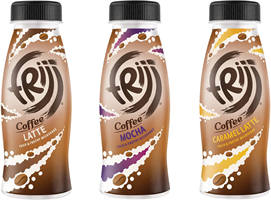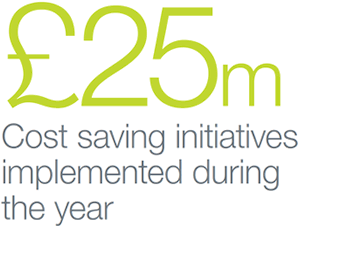Dairies


|
£ million |
2013/14 |
2012/13 |
|---|---|---|
|
Revenue |
944.8 |
951.6 |
|
Product group profit |
18.8 |
9.8 |
|
Margin |
2.0% |
1.0% |

Dairy Crest processes and delivers fresh conventional, organic and flavoured milk to major retailers, ‘middle ground’ customers (including, for example, smaller retailers, coffee shops and hospitals) and residential customers. The Dairies product group analysis includes revenues and profits from these operations. It also takes in revenues and profits from one of our four key brands, FRijj, the country’s leading ready to drink milk brand, and cream and milk powders
We operate three modern dairies at Severnside, Chadwell Heath and Foston where we pack milk into polybottles; Hanworth, where we pack milk into glass bottles for residential customers; and a specialist cream potting facility at Chard. In addition we have around 70 operational depots from which we deliver milk to middle ground and residential customers.
We also run an ingredients operation that helps balance seasonal milk supplies by drying surplus milk and selling skimmed milk powder. We aim to minimise throughput in this business to reduce our exposure to commodity markets as far as possible.
The raw milk that we purchase from farms contains more cream than the milk sold to customers does. We use some of the surplus cream generated during the bottling process to make butter with cream being transferred into our Spreads operation at market prices. The balance of this surplus cream that is not used to make butter is sold by our ingredients operations either as bulk butter or cream.
Reported revenue was broadly flat in the year at £944.8 million (2013: £951.6 million) with higher selling prices offsetting lower volumes. Profits from the Dairies product group increased to £18.8 million (2013: £9.8 million).
Medium term target to achieve 3% return on sales
We have set ourselves the target of achieving a 3% return on sales from our Dairies operations and in the year ended 31 March 2014 the margin increased from 1% to 2%.
There are 4 elements to our plan:
- Growing FRijj
- Reducing costs and becoming more efficient
- Getting the right returns from fresh milk sales
- Maximising profits from the sale of surplus properties
Increased profits from these actions are offset by cost inflation and reduced residential sales which command an above average margin.
The improvement in margins in the year came about from higher profits from the sale of redundant properties. For the year ended 31 March 2014 these were £18.2 million against £7.7 million in the prior year. The uplift was partially offset by higher employee bonuses which would not have been paid had the higher level of property profits not been achieved. Margins excluding property profits declined partly as a result of these higher bonuses and partly because of lower cream prices in the last part of the year, which were not reflected in lower milk purchase prices. We anticipate profits from the sale of surplus properties to continue at a more normal level of between £5 million and £10 million in future years.
FRijj – on track for growth after upgrade of production facilities
Over the year as a whole FRijj sales declined by 4% by value and 5% by volume. FRijj sales were down 17% by value in the first half as we scaled back promotions while we increased our production capacity and capability. Second half sales were much stronger following the upgrade of our production facilities in the first half. We also introduced new flavours and new pack sizes and configurations into the market. Sales in the second half of the year ended 31 March 2014 grew by 11% compared to the second half of the year ended 31 March 2013.
The ready to drink flavoured milk market, in which FRijj is the leading brand, has continued to grow strongly during the year. Total market sales are up by 16% in value and 9% by volume.
The upgrade of our production facilities also delayed the full launch of our new long life product which we now expect to take place in the year ending 31 March 2015. This will allow us to grow FRijj sales into convenience and other outlets where less refrigerated storage is available.
Cost saving initiatives underpin improved profitability
Across Dairy Crest as a whole we implemented annual cost saving initiatives during the year of £25 million, ahead of our established target of £20 million. Our Dairies operations benefitted most from these. Key elements of the savings were the on-going closure of depots, increased use of lighter bottles which contain less plastic and reduced distribution costs.
The total annual cost of moving milk from the farms that supply us to our customers via our dairies exceeds £200 million. We use a combination of our own transport and that of third parties. We collect milk for our dairies from over 1,000 farms across England and Wales and deliver daily to many of our customers including around 700,000 residential customers and the individual stores of most of our major retail customers. More efficient vehicles, improved routing software and better driver utilisation and training can all make a significant difference to the cost of this operation. We expect to make further savings in our distribution costs in the future.
Recovering higher milk costs
The prices we paid our farmers for milk increased by around 8% during the year. This resulted in additional raw material costs for our Dairies operations of over £40 million. For most of the year these higher costs have been recovered from higher cream selling and transfer prices (from our Spreads operations), and higher selling prices to our customers. In a tough consumer environment increasing selling prices was not easy and we chose to stop supplying some smaller customers who were not prepared to pay higher prices.
Higher prices to farmers also meant that we had to increase the price we charged our residential customers. Delivering milk to these customers remains important to us but sales continue to fall as more customers choose to buy their milk from shops rather than having it delivered by their milkman. Overall residential sales fell by 10% compared to the previous year. We continue to support our internet proposition for residential customers, milk&more, and we believe this has reduced the decline in residential sales.
As a result of lower milk sales to middle ground and residential customers we sold our depot based business in the North West of England and we also closed a small dairy in Wales, Proper Welsh Milk. We are also carrying out a strategic review of FoodTec UK Limited, a small subsidiary which manufactures food ingredients.
Towards the end of the year cream prices fell and this adversely impacted revenues and profits from the Dairies operations – with some benefit being seen in our Spreads operations.
At the same time most major retailers chose to reduce the price at which they sell milk to consumers. This had the effect of further increasing the gap between these prices and those which we charge our residential customers. We expect this to have an adverse effect on our residential sales and the profits we make from this delivery channel.
Property profits exceed expectations
As residential and middle ground sales reduce we close distribution depots. Sales of these surplus properties generate cash and the profits from them contribute to our targeted 3% margin. In January 2014 we completed the sale of one such depot, Nine Elms, in London. The sale of this particularly valuable property for £17.6 million generated a profit of £15.3 million and contributed to total property profits of £18.2 million in the year. Looking forward we anticipate profits from the sale of depots we no longer require are likely to return to a more normal £5 million to £10 million in future years.
